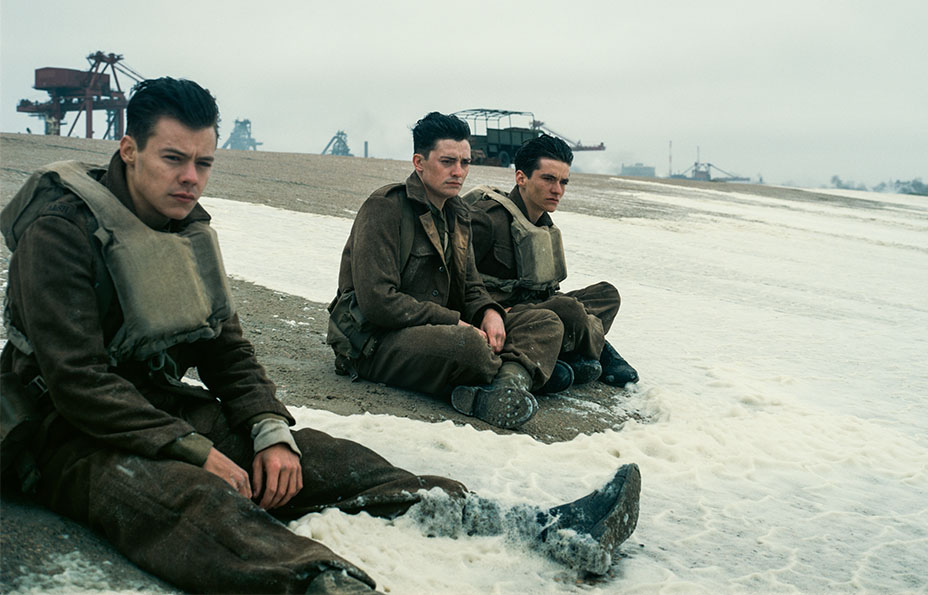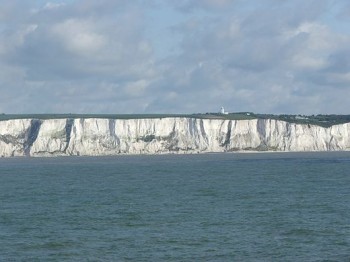CHRISTOPHER NOLAN: DUNKIRK (2017)
HARRY STYLES, ANEURIN BARNARD AND FIONN WHITHEAD IN DUNKIRK
The helplessness of war: Nolan's radical, succinct epic
Here is a great and classic war movie that's radically different - not even about "war" in the usual sense. Because it's a great "escape," not a battle, the evacuation called "Operation Dynamo," between 26 May and 4 June 1940, of 300,000 Allied soldiers from the northern French beach at Dunkerque where they were trapped by the Germans. Volunteers, with small English working and recreational boats, came from Dover, only 26 miles away, to rescue the troops, necessary because only they could get into the shallow shore and dodge the attacking Germans. Dynamo was a miraculous achievement (without it some say the Germans would have won the war) and we don't really see how it was carried out. Instead Nolan provides intense glimpses of everything that was going on, on land, at sea, and in the air - and above all he shows us the terror and helplessness of the common soldier (not to mention the ranking officer - because they are at the mercy of tight circumstance here too). Not a war movie? This is nonetheless one of the greatest of them.
And controversial, and destined to be long debated. For some it's a chaotic mashup of time that makes no sense. For others - including me, since I was enthralled, if confused - it is a "Hitchcockian" triumph of brilliant editing. I hadn't read any reviews in advance to prepare and didn't quite grasp the importance of the opening outline chapters. They are typically telegraphic - words are kept at a minimum here: "1. The Mole: one week. 2. The Sea: one day. 3. The Air: one hour." These three time-schemes are intercut together, an hour of fighter plane battling with a week of activity on the beach and in containers, battleships, a day of coming and going of the small rescue boats. So there you are: I have to go back and watch it all again, if I dare. Nonetheless the intercut three levels are as deeply visceral as you could imagine.
This is war like Tolstoy's description of the Battle of Waterloo in War and Peace: chaotic, incomprehensible and terrifying. And that's how you feel it, as you watch. There is no safe place, not on land, at sea, or in the air. A new level of accuracy is achieved. You've never been in a ship that was torpedoed like this, or flown inside the cockpit of a Spitfire like this (and seen what it's like to try to hit a German plane struggling with the controls), or been in the water with soldiers when a plane falls into the water nearby and explodes in flames and you dive to escape the fire. However these different experiences are recreated in the film, there is never the demoralizing sense so common today that they're "just CGI." The cinematography of of Hoyte van Hoytema achieves beauty, terror, and completeness. All is forged together, even Hanz Zimmer's bombastic music (though it's too loud at times). This is a great director at the top of his game.
This is, by the way, a low point for Britain, but a moment when Churchill turned defeat into victory with his "We shall fight on the beaches....we shall never surrender" speech - neatly provided us not in the famous stentorian tones but read by a young soldier, in a train car, from a newspaper, at film's end - and it is a moment without Americans. And without stars, though, strictly speaking, there are lots of them, from newcomers like Fionn Whitehead ("Tommy" in the credits, but nameless, but the first pale young soldier we follow), Aneurin Barnard, Barry Keoghan (the tragic young George), Jack Lowden, and many other young actors with small but key roles, including One Direction's Harry Styles - to big names like Tom Hardy (in a "mask" once again as the key fighter pilot); Kenneth Branagh as the ranking naval officer; Mark Rylance as Mr Dawson, who stands for all the captains of small rescue boats. Rylance's performance is typically perfect and invisible. This is an English movie in the old sense - no stars, everyone a star.
Dunkirk is in contrast with Spielberg's Saving Private Ryan, without bloody awful horribleness. There are plenty of people dying, from the oft-described opening behind the line in town when we follow three young English soldiers and only one, "Tommy," gets through alive, but there's no gore or running blood or severed limbs. The horror is desperately struggling to get onto a ship that then is blown up, or being in the hold of one and seeing it shot full of holes, or landing your plane on the water and being trapped in it as it sinks. Or rescuing a shell-shocked man (Cillian Murphy) who then creates mayhem and tragedy on your little boat, but later shows how in a war villains can turn into heroes. Dunkirk has a lot to say amid the confusion and chaos that are its troubling default setting, but gore is not its message.
Dunkirk is an unusually intense mix of the epic and the intimate. It was shot in 70% with iMax cameras - bolted on the little planes, in the water, and hand held (though they weigh 50 pounds) on board ships and containers, to be viewed in iMax theaters (or those few cinemas projecting in 70mm) in square intimate academy ratio, with many closeups so you can see Kenneth Branagh's sickly pallor, the mask over Tom Hardy's face, the gloss of Fionn Whitehead's black hair, and witness the color of the flames when Farrier sets fire to his plane after he lands on the Dunkirk beach (where Nolan actually filmed), so the Germans who are coming for him - who we never hear or see, and experience only as the soldiers do, through their bullets, bombs, and torpedoes - can't get it. It's very bright, and very orange, and it's burned into my memory.
Dunkirk opened in France 19 July, US and UK, 21 July 2017.





 Reply With Quote
Reply With Quote

Bookmarks